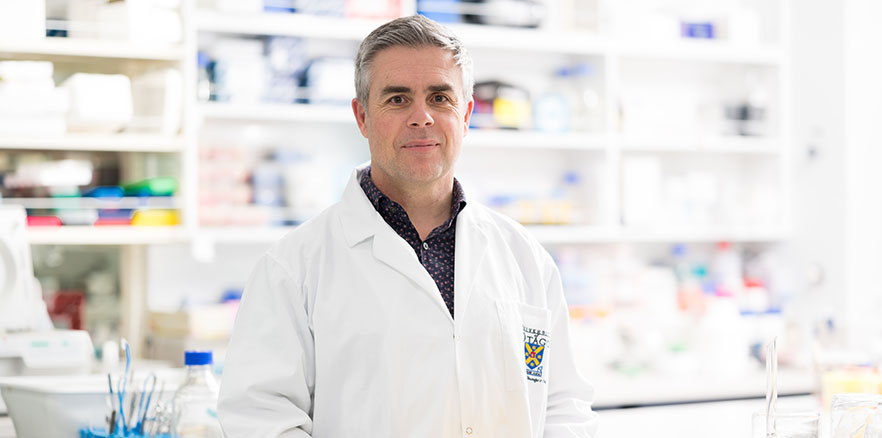
Associate Professor Logan Walker
A modestly self-described “average” academic school student and “late bloomer” at university, Associate Professor Logan Walker now sits squarely at the cutting edge of international cancer genomics research.
Leading the cancer genomics efforts of the University of Otago, Christchurch's Mackenzie Cancer Research Group, Associate Professor Logan Walker's research focuses on improving the application of genomic technologies in health services to reduce the impact of cancer on the community.
“Genetic health, or healthcare based on knowing our genetic code, is an exciting and critical research area developing at rapid pace, with cheaper and more powerful DNA-based technologies revolutionising cancer diagnosis,” says Walker.
“However, the major challenge that comes with this is figuring out how to decode this information to benefit patients and their whānau. My research is focused on developing new methods to help evaluate the clinical significance of these genetic variants in our DNA code.”
Walker is understood to be the first Aotearoa New Zealand researcher to have been awarded both a Sir Charles Hercus Health Research Fellowship (2012-2016) and a Rutherford Discovery Fellowship (2016-2021), though there have been three more since.
“The Hercus Fellowship supported our initial work, decoding breast cancer genetics to assist the diagnostic community's interpretation of genetic results. The Rutherford Fellowship funded the follow-up work, examining New Zealand's genetic health services and identifying areas ripe for further development,” Walker explains.
The Rutherford Discovery Fellowship carried a personal family link for Walker – his wife Sherilyn's parents are both descended from Sir Ernest Rutherford's family.
“The family link is my greatest claim to fame. Sir Ernest apparently used to sit on Sherilyn's grandmother's bed and tell her ghost stories!”
The Canterbury farmer's son says he showed no signs of scientific greatness himself at a young age.
“I only managed 33 per cent in a genetics test in my final year at Ellesmere College and was more focused on sport. I completed a BSc at Canterbury University, but it wasn't until I was exposed to research during my Master's degree, and later with my PhD here at the University of Otago, Christchurch, that I realised science was my true calling.”
His studies coincided with a personal health setback. Ironically, he was diagnosed with a genetic disease of his own – the autoimmune disorder ankylosing spondylitis (a form of rheumatoid arthritis).
“It started in my early 20s with a lot of back and body pain, which got so bad at times that I struggled to walk. I've lived with chronic pain and fatigue ever since, which has forced me to reassess my work-life balance. I make the most of the good days when I'm more physically able, but I'm lucky that much of my work can be done sitting at a computer or laptop.”
As well as a decade leading the cancer genomics efforts of the Mackenzie Cancer Research Group, he is co-director of Genetics Otago with Dr Louise Bicknell, and has been invited onto multiple international genetic expert panels.
Walker and his team are currently steering two of the largest international studies of breast cancer and endometrial cancer, aimed at discovering new genes to help determine whether women will develop both cancers.
“We've initiated projects aimed at developing novel preventative medicines to lower cancer risk in women genetically pre-disposed to breast and ovarian cancers. It's early days but, if successful, these therapeutics will be transformative in controlling and reducing the social and economic impact of cancer.”
Recent awards
- Rutherford Discovery Fellowship (2016)
- Sir Charles Hercus Health Research Fellowship (2012)
- University of Otago Early Career Award for Distinction in Research (2016)
- Eli Lilly Award - New Zealand Society for Oncology (2003
Funding
- Breast Cancer Cure
- Breast Cancer Foundation NZ
- Cancer Research Trust NZ
- Health Research Council of New Zealand
- Mackenzie Charitable Foundation
- Royal Society Te Apārangi
More stories about early career researchers
This story is part of the research publication 'He Kitenga 2022: Talented Futures', which presents the different pathways into research that early career researchers follow.
